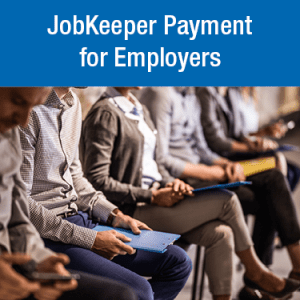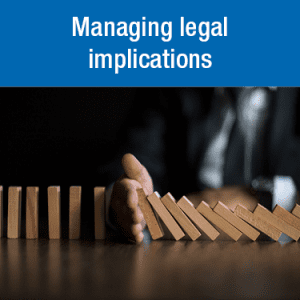Key Federal and State COVID-19 business assistance measures
Disclaimer: This information is not provided as financial advice but as a summary of the Federal and State government business-related initiatives. As new measures are announced, we will update this guide.
In response to the escalating Coronavirus pandemic and its implications on business, Federal and some State governments have announced support packages to boost cash flow, business investment, and secure labour.
Federal Government
JobKeeper Payment
- Eligible employers (excluding those subject to the Major Bank Levy) can receive and pay their eligible employees a wage subsidy of $1,500 per fortnight.
- Eligible employees will be able to receive $1500 a fortnight even if they received less than $1,500 per fortnight (before tax) or have been stood down (and is not receiving salary) in effect, receiving a ‘pay rise’ under these measures.
- Eligible employees that earn above $1,500 will be entitled to the $1,500. The employer may provide them a top-up so that they are paid their usual income.
For more information on eligibility criteria and how the scheme will operate, please read our JobKeeper Payment FAQ here.
Boosting cash for employers
- The Government will provide up to $100,000 back to business, with a minimum payment of $20,000 for eligible businesses. The payment will be tax free.
- An additional payment is also being introduced in the July – October 2020 period. Eligible entities will receive an additional payment equal to the total of the previous payment they received.
- Small and medium business and now Not-for-Profit entities (NFP’s) with aggregated annual turnover under $50 million and that employ workers will be eligible.
- The payment will be delivered by the Australian Taxation Office (ATO) as a credit in the activity statement system from 28 April 2020 upon businesses lodging eligible upcoming activity statements.
- Eligible businesses that withhold tax to the ATO on their employees’ salary and wages will receive a payment equal to 100 per cent of the amount withheld, up to a maximum payment of $50,000.
- Eligible businesses that pay salary and wages will receive a minimum payment of $10,000, even if they are not required to withhold tax.
To find out more, please visit business.gov.au
Instant asset write-off
- The threshold has been increased from $30,000 to $150,000 and expanded access to include businesses with aggregated annual turnover of less than $500 million (up from $50 million). Initially, this applied from 12 March 2020 until 30 June 2020, for new or second hand assets first used or installed ready for use in this timeframe. However, it’s now been extended for six months and applies until 31 December 2020.
To find out more, please visit business.gov.au
Backing business investment
- A time limited 15-month investment incentive will accelerate depreciation deductions. This applies to eligible assets acquired from 12 March 2020 and first used or installed by 30 June 2021. Businesses with a turnover of less than $500 million will be able to deduct 50% of the cost of an eligible asset on installation, with existing depreciation rules applying to the balance of the asset cost.
To find out more, please visit business.gov.au
Supporting apprentices and trainees
- A wage subsidy of 50 per cent of the apprentice’s or trainee’s wage paid during the 9 months from 1 January 2020 to 30 September 2020. Where a small business is not able to retain an apprentice, the subsidy will be available to a new employer.
- Employers will be reimbursed up to a maximum of $21,000, per eligible apprentice or trainee ($7,000 per quarter).
- The subsidy will be available to small businesses employing fewer than 20 full time employees who retain an apprentice or trainee.
- Employers of any size and Group Training Organisations that re engage an eligible out of trade apprentice or trainee will be eligible for the subsidy. The apprentice or trainee must have been in training with a small business as at 1 March 2020.
- Employers will be able to access the subsidy after an eligibility assessment is undertaken by an Australian Apprenticeship Support Network (AASN) provider.
To find out more, please visit business.gov.au
Temporary relief for financially distressed businesses
- A temporary increase in the threshold at which creditors can issue a statutory demand on a company and the time companies have to respond. Increasing the current minimum threshold for creditors issuing a statutory demand on a company under the Corporations Act 2001 from $2,000 to $20,000. This will apply for 6 months.
- A temporary increase in the threshold for a creditor to initiate bankruptcy proceedings, an increase in the time period for debtors to respond to a bankruptcy notice and extending the period of protection a debtor receives after making a declaration of intention to present a debtor’s petition. The statutory time frame for a company to respond to a statutory demand will be extended temporarily from 21 days to 6 months. This will apply for 6 months.
- Temporary relief for directors from any personal liability for trading while insolvent. Directors will be temporarily relieved of their duty to prevent insolvent trading with respect to any debts incurred in the ordinary course of the company’s business. This will relieve the director of personal liability that would otherwise be associated with the insolvent trading. It will apply for six months.
- Providing temporary flexibility to provide targeted relief for companies from provisions of the Act to deal with unforeseen events that arise because of the coronavirus health crisis.
- The Australian Taxation Office (ATO) will tailor solutions for owners or directors of businesses that are currently struggling due to the coronavirus, including temporary reduction of payments or deferrals, or withholding enforcement actions including Director Penalty Notices and wind-ups.
To find out more, please visit business.gov.au
COVID-19 Export Capital Facility
- Eligible Australian exporters can access loans from $250,000 to $50 million.
- Repayments are up to two years for loans and three for guarantees and bonds.
- To be eligible, exporters or businesses operating in an export supply chain, must have been trading for at least two years, have had profitable operations in either of the two financial years prior to markets being impacted by COVID-19, are unable to secure finance from the private market because of COVID-19, and have an annual turnover of at least $250,000.
- The Facility can assist with working capital support, capital investment, international expansion and online growth.
State Governments
Summary of measures
- Payroll tax for April to September will be waived for eligible businesses affected by the prohibited activities lists including those in the hospitality, creative arts and entertainment industries.
- Businesses in the construction industry can defer their payroll tax liability for the six months from April to September 2020.
- Businesses with Group Australia-wide wages of up to $10 million can defer their 2020-21 payroll tax, interest free until 1 July 2022.
- The Payroll tax concessions will require businesses to lodge an application with the ACT Revenue Office.
- Wages that are subsidised by the Federal government’s JobKeeper payment are exempt from payroll tax. This exemption does not apply to any part of wages paid by an employer that are not subsidised by the JobKeeper payment:
- Where an employee’s entire wage is subsidised by the JobKeeper payment (i.e. they ordinarily receive a wage of less than $1,500 per fortnight), the entire amount will be exempt from payroll tax;
- Where an employee ordinarily receives wages greater than $1,500 a fortnight and the employer continues to pay their full wage (with $1,500 subsidised by the JobKeeper payment), only the amount exceeding $1,500 per fortnight will be subject to payroll tax.
- Food business registration and on and off-licence liquor licencing fees, will be waived for 12 months and outdoor dining fees for 2020-2021 will be waived. Licence fees for off-licence venues with annual gross liquor purchases of below $3 million will also have their licence fee waived. In the instance that a food business registration has been prepaid for more than one year in advance, an additional 12 months will be added to the licence.
- A rebate of $750 will be applied to the next electricity bills of small business owners with electricity usage below 100 megawatts per year.
- Owners of commercial property with an Average Unimproved Value below $2 million will be eligible for a rebate on their commercial rates fixed charge.
Summary of measures
Payroll tax
- Businesses with total grouped Australian wages for 2019/20 of more than $10 million can defer payment of their March, April, May and June payroll tax for six months.
- Businesses with total grouped Australian wages for 2019/20 of less than $10 million will have their annual payroll tax liability reduced by 25%. This will be calculated when the annual reconciliation is lodged (due 28 July). These businesses are not required to pay their March, April, May and June payroll tax, as this should enable them to obtain a more immediate cash flow benefit from the 25% reduction.
- The tax free threshold will increase from $900,000 to $1 million from 1 July 2020.
Land tax
- Land owners may be eligible for a reduction of up to 25% of the land tax payable for 2020. The reduction is available where:
- The land is used for business or residential purposes.
- The property is leased to a residential tenant, or a business tenant with annual turnover of up to $50 million, who can demonstrate financial distress resulting from the COVID-19 outbreak. For residential tenants this is a drop of 25% of household income, for commercial tenants it is a 30% drop in revenues (this aligns with the JobKeeper conditions).
- The rent of the affected tenant is reduced by at least as much as the land tax reduction.
- The land tax is directly related to the property for which rent has been reduced.
- A three-month deferral will be available for outstanding land tax payments if you have received a rebate or waiver.
Small Business Grant
- Small businesses who have been significantly affected by COVID-19 restrictions may receive grants of up to $10,000.
- To be eligible, businesses will need to:
- Have between 1-19 employees and a turnover of more than $75,000.
- A payroll below the NSW Government 2019-20 payroll tax threshold of $900,000.
- Have an Australian Business Number as at 1 March 2020, be based in NSW and employ staff as at 1 March 2020.
- Be subject to closure or are highly impacted by NSW Government health directions in relation to COVID-19.
- Use the funding for unavoidable business costs such as utilities, overheads, legal costs and financial advice.
- Documentation is required to be provided on application for the grant. where certain eligibility requirements are met.
- For further detail on eligibility requirements, please visit Service NSW Small Business Support Grant.
Other measures
- Parking space levy will be deferred until 30 September 2020.
- NSW will waive a range of fees and charges for small businesses, including bars, restaurants, cafes and trades.
To find out more, please visit NSW Government – COVID-19 Tax Relief Measures
Summary of measures
- For businesses that can demonstrate substantial hardship due to Covid 19, payroll tax will be waived for 6 months (for small and medium businesses) or deferred for 6 months (for large businesses). Businesses will need to apply for this concession.
- All NT businesses will be able to access a $10,000 Business Improvement Grant, followed by an additional $10,000 grant if they contribute $10,000 of their own finds.
- The grant can be used to purchase goods and services to make permanent physical improvements to a business (land and/or building) that help improve its efficiency and customer experience.
- Grants of up to $100,000 will be given to not-for-profit and community organisations to engage local businesses to do repairs, renovations and upgrades to their property and facilities.
- The payroll tax exemption has been extended to 30 June 2021 for eligible employers.
- A small business survival fund will be available, providing grants of up to $50,000 to small businesses operating in industries affected by social gathering restrictions e.g. food, drink and retail, and beauty and personal care services.
Summary of measures
- Businesses may be eligible to apply for a refund of payroll tax for 2 months, a payroll tax holiday for 3 months, and a deferral of payroll tax for the remainder of the 2020 calendar year.
- Wages that are subsidised by the Federal government’s JobKeeper payment are exempt from payroll tax. This exemption does not apply to any part of wages paid by an employer that are not subsidised by the JobKeeper payment:
- Where an employee’s entire wage is subsidised by the JobKeeper payment (i.e. they ordinarily receive a wage of less than $1,500 per fortnight), the entire amount will be exempt from payroll tax;
- Where an employee ordinarily receives wages greater than $1,500 a fortnight and the employer continues to pay their full wage (with $1,500 subsidised by the JobKeeper payment), only the amount exceeding $1,500 per fortnight will be subject to payroll tax.
- Land owners may be eligible for a reduction of up to 25% of the land tax payable for 2020 where all or part of a property is leased to one or more tenants and all the following apply.
- The ability of one or more tenants to pay their normal rent is affected COVID-19.
- Rent relief is provided to the affected tenant(s) of an amount at least commensurate with the land tax rebate.
- The land owner complies with the leasing principles even if the relevant lease is not regulated.
- A similar land tax rebate is available where the land owner’s ability to obtain tenants is adversely affected by COVID-19 and this is causing financial issues for the land owner.
- There is an automatic waiver of the 2% land tax foreign surcharge for foreign entities for 2019-20.
- There is an automatic 3 month deferral of land tax liabilities.
- Low interest loans of up to $250,000 for carry on finance with an initial 12-month interest free period for businesses to retain staff.
- Sole traders, small and medium businesses consuming less than 100,000 kilowatt hours will receive a $500 rebate on their power bill.
- There are a range of grants and targeted assistance programs for businesses in sectors particularly affected by COVID-19.
To find out more, please visit Queensland Government – COVID-19 Business Assistance Finder
Summary of measures
COVID-19 relief for SA Property Owners
- The Valuer-General has recently announced the deferral of the statewide Revaluation Initiative (RI) allowing property owners to recover from COVID-19 and the impact of the summer bushfires.
- It was touted by some property commentators that the RI was likely to totally negate the effect of:
- The lowering of the land tax rates (top rate to be reduced to 2.4% from 3.7%); and
- The increasing of the relevant thresholds (the tax free threshold to $450,000 from $391,000 and the top land tax threshold to around $1,350,000 from $1,302,000) that was set to apply from 1 July 2020 as a result of the passing of the Land Tax (Miscellaneous) Amendment Act 2019.
- In addition to land tax, the Valuer-General amounts are also used by councils, SA Water and the State Government for determining council rates, sewer charges and the emergency services levy. This is a welcome relief for both property owners and tenants.
- For more information on COVID-19 relief for SA Property Owners, please visit Update from the Office of the Valuer-General.
Payroll tax relief (Up to $60 million of savings to business)
- SA will waive payroll tax from April to September for all eligible businesses with an annual payroll (grouped) up to $4 million.
- Employers with grouped annual wages above $4 million able to defer payroll tax payments for six months on demonstration of significant impacts on cash flow of coronavirus.
- Wages that are subsidised by the Federal government’s JobKeeper payment are exempt from payroll tax. This exemption does not apply to any part of wages paid by an employer that are not subsidised by the JobKeeper payment.
Land tax relief (Up to $13 million in additional savings)
- From July, SA’s land tax reforms will kick in.
- Under the new measures, individuals and businesses with outstanding quarterly bills for 2019-20 able to defer payments for six months.
- For 2020-21 Land Tax Transition Fund relief will be increased from 50% to 100% based on existing relief criteria guidelines.
Fees and Charges
- SA will Waive liquor licence fees for 2020-21 for those hotels, restaurants, cafes and clubs forced to close as a result of new social distancing restrictions.
$300 million Business and Jobs Support Fund
- SA will establish a fund to support individual businesses and industry sectors directly affected by coronavirus and face potential collapse – and the loss of thousands of jobs – as a result.
$250 million Community and Jobs Fund
- SA will establish a fund to support community organisations, sporting, arts and recreational bodies, non-profit organisations as well as some industry sectors whose operations have been impacted by the coronavirus.
- The fund will also help with training of South Australians seeking new skills and employment and to assist organisations meet increased demand for services including emergency relief.
Regional Growth Fund
- SA will bring forward the Regional Growth Fund 2021-21. This will support up to $5 million for the Regional Growth Fund Competitive Grants and $10 million for the Minister for Primary Industries and Regional Development to commit to strategic regional growth projects. Applicants can seek grants from $50,000 up to $2 million.
Fee and rent relief for nature-based tourism business
- Commercial tour operator (CTO) licence fees will be waived for six months from 1 April and rents for properties leased on Crown Land will also be waived.
Fee relief for COVID19-hit resources sector
- SA has implemented an immediate deferral of mineral exploration licence fees and annual petroleum and geothermal licence fees due in the next six months. These licence fees will now not be due until 31 December 2020.
- A 12-month waiver of committed expenditure for all mineral exploration licence holders as well as an expansion of allowable expenditures towards minimum Petroleum Retention Licence requirements during a period of low oil prices.
$10,000 Small Business emergency cash grant
- SA will grant eligible small businesses a $10,000 emergency cash grant.
- To be eligible, businesses might have a payroll less than $1.5 million, employ people in SA, and not be entitled to a payroll tax waiver under COVID-19 support measures already introduced by the State Government (for businesses with payrolls of up to $4 million).
To find out more, please visit Revenue SA – COVID-19 Relief
Summary of measures
- Businesses with payrolls of up to $5 million will be able to apply, based on the impact of the virus, to have their payroll tax waived for 2019-20 financial year. This will include a refund of previous paid taxes and a waiver of future tax payments.
- Payroll tax liabilities will be waived for hospitality, tourism and seafood industry businesses for the 2019-20 financial year.
- Wages that are subsidised by the Federal government’s JobKeeper payment are exempt from payroll tax. This exemption does not apply to any part of wages paid by an employer that are not subsidised by the JobKeeper payment:
- Where an employee’s entire wage is subsidised by the JobKeeper payment (i.e. they ordinarily receive a wage of less than $1,500 per fortnight), the entire amount will be exempt from payroll tax;
- Where an employee ordinarily receives wages greater than $1,500 a fortnight and the employer continues to pay their full wage (with $1,500 subsidised by the JobKeeper payment), only the amount exceeding $1,500 per fortnight will be subject to payroll tax.
- Tasmania will offer interest free business loans for businesses with a turnover of less than $10 million to purchase equipment or restructure business operations.
- A payroll tax rebate is available to approved employers for new youth employees (aged 24 or under) employed between 1 April and 31 December 2020.
- Land Tax will be waived for commercial property for the 2020-21 financial year, where the business owner can demonstrate that their business operations have been affected by COVID-19.
On 13 September 2020 the Victorian Government announced an additional $3 billion Business Survival and Adaptation Package to provide cash grants, tax relief and cashflow support to businesses most affected by COVID-19 restrictions. The package also aims to help businesses survive and keep Victorians in jobs.
On 14 September 2020 the Victorian Government announced an additional $290 million support package for to support the entertainment industry, Melbourne’s CBD businesses and Sole Trader businesses.
Stay updated by referring to our latest articles here and/or the FAQs page for up-to-date information.
Summary of the Recent Announcements:
| Relief Measures | Value |
| Business Survival – Announced 13 September 2020 | |
|
$822 million |
|
$251 million |
|
$3 million |
|
$4.3 million |
| Business Adaptation – Announced 13 September 2020 | |
|
$20 million |
|
$15.7 million |
|
$8.5 million |
| Taxes, Licences and Fees – Announced 13 September 2020 | |
| Tax Discounts Brought Forward | |
|
$41 million |
| Tax and Fee Waiver | |
|
$6 million |
|
$30 million |
|
$27 million |
| Tax and Fee Deferrals* | |
|
$1.7 billion |
|
$33 million |
|
|
| *Note: these are deferrals only and will still need to be paid at some point in the future. | |
| Outdoor Eating and Entertainment – Announced 14 September 202 | |
|
$100 million |
|
$87.5 million
|
| Business Survival – Announced 14 September 2020 | |
|
$100 million |
Business Support Fund Round 3 – a closer look
Eligibility:
To be eligible for a grant from this program, applicants must:
- operate a business located within Victoria; and
- participate in the JobKeeper Payment scheme; and
- employ people and be registered with WorkSafe; and
- have had an annual payroll of less than $10 million in FY19/20; and
- be registered for GST; and
- hold an ABN; and
- be registered with the responsible Federal or State regulator.
A full list of the eligibility criteria for a grant will be published when applications open.
How much Funding will I receive?
An eligible business will receive:
- $10,000 if its annual payroll is less than $650,000;
- $15,000 if its annual payroll is between $650,000 and $3 million; or
- $20,000 if its payroll is between $3 million and $10 million.
How do I apply?
Applications will open soon. We encourage interested businesses to subscribe to the Business Victoria Update newsletter (hyperlink: https://www.business.vic.gov.au/subscribe-to-newsletters) or our latest articles here.
Summary of measures
- WA will bring forward the $1 million payroll tax threshold by six months to 1 July 2020.
- Payroll tax paying businesses with a payroll between $1 million and $4 million will receive a one-off grant of $17,500.
- Payroll tax will be waived from March to June for employers with payroll of less than $7.5 million.
- WA will waive a range of government fees and charges for small businesses including bars, cafes, restaurants and tradies.
- Payroll tax will be waived from March to June for employers with payroll of less than $7.5 million.
- Wages that are subsidised by the Federal government’s JobKeeper payment are exempt from payroll tax. This exemption does not apply to any part of wages paid by an employer that are not subsidised by the JobKeeper payment.
To find out more, please visit WA Government – COVID-19 Relief: Payroll Tax Employer Guide
Related articles
Find the latest news on how COVID-19 is impacting businesses. Check in here to see our latest commentary.
15 April | Flawed JobKeeper Payment could cause more harm to small businesses
Australia’s JobKeeper Payment will be a saviour for many businesses and their employees, but draft rules implementing the initiative contain a fatal flaw that will likely mean thousands of employees of small businesses miss out on the $1500 payment.
10 April | SA Govt $10,000 Small Business emergency cash grant
The South Australian grants apply to businesses with a payroll of less than $1.5 million, and not entitled to a payroll tax waiver under COVID-19 support measures already introduced by the State Government (for businesses with payrolls of up to $4m).
09 April | Federal Government releases commercial tenancies code of conduct
On Tuesday 7 April saw, the Federal Government released another announcement in response to COVID-19, the Commercial Tenancies Code of Conduct. The Code establishes a mandatory framework for the landlords and tenants of SME businesses impacted by COVID-19.
08 April | The six-month safety net for directors – is it a free pass?
As part of the Government’s response to COVID-19, company directors now have a six-month relief from any personal liability for trading while insolvent.
06 April | COVID-19 economic response measures and how they will assist SGEs
If you are operating a significant global entity (SGE) which is being impacted negatively by the implications of COVID-19, you may be eligible to receive State or Federal Government assistance.
Below is a comprehensive list of Government response measures with commentary on whether they are available to SGEs and if so, information on eligibility and access.
23 March | Victorian Government’s Economic Survival Package – What it means for you
Last Saturday the Victorian Government released high level details of a $1.7 billion economic stimulus package. Here’s what we think it means for you.
17 March | NSW pledges $1.6b for business assistance
New South Wales will fund payroll tax breaks and fee reductions for small businesses as part of its $2.3 billion economic stimulus package to counter the impacts of the escalating Coronavirus outbreak.
12 March | Coronavirus stimulus pledges $8.7b for business assistance
Canberra funds tax breaks, wage subsidies and increased cash flow for businesses as part of its $17.6b Coronavirus stimulus.





















